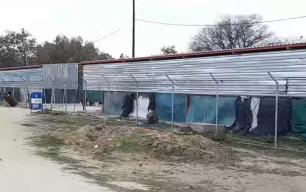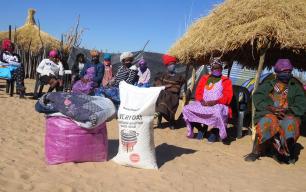Northerners derive income from ‘efundja’ fish

While the seasonal ‘efundja’ floods often bring devastation to northern Namibia, they also usher in an unexpected source of income for many residents - the abundance of local catfish that accompany the high waters.
Across the flood-affected regions of Ohangwena, Omusati, Oshana, and parts of Oshikoto, a common sight is people, predominantly those residing in vulnerable areas, casting their nets and retrieving their catch. This fish becomes a vital commodity, primarily sold to the public, with a smaller portion reserved for household consumption and dried for future use.
Confidente recently spoke with several fish vendors operating by a bridge along the Oshikango- Odibo-Edundja gravel road which is near Oshikango town along the Namibian-Angolan border.
One vendor, who identified himself only as Kombinga, explained that he fishes directly at the bridge, where he and his colleagues have strategically placed their nets. He detailed their routine of checking and emptying the nets every three hours. “The water is flowing strongly and the fish is caught in the nets. Some of my colleagues are using hooks to catch. We always make a good catch each day and we have to sell it to earn an income and money is good,” he emphasized. He further noted that many involved in this trade are unemployed, and the ‘efundja’ fish provides a crucial income they would otherwise lack. Both men and women were actively engaged in catching and selling the fish. “Of course it destroyed our houses and crops, displaced us but we are also thankful that it comes after every two or three years because it brings fish,” Kombinga added, highlighting the bittersweet nature of the floods.
Kange Angula, another vendor observed at the bridge, explained to Confidente that the fish are typically bundled in groups of five to ten, with prices ranging from N$ 10 to N$ 50. “It depends of what and how you discuss with the customers. Most customers don’t blink when you tell them the price. They just pay. However, there are those who always want to cheat you. If it’s getting late in the afternoon, you accept what the customer is willing to pay because the fish will be spoiled the next day,” she said. Angula also shared how she uses the earnings from fish sales to purchase food, cosmetics, and other necessities, while also managing to save a portion.
The ‘efundja’ phenomenon typically occurs between February and March, contingent on rainfall in central Angola, and the floodwaters usually recede by June or July. This natural event is triggered when the Cunene River, which forms the border between northwestern Namibia and southwestern Angola, overflows its banks, leading to widespread flooding. For the people of the north, this challenging period also presents a unique opportunity to derive sustenance and income from the bounty the floodwaters brin
- 350 views










Comments